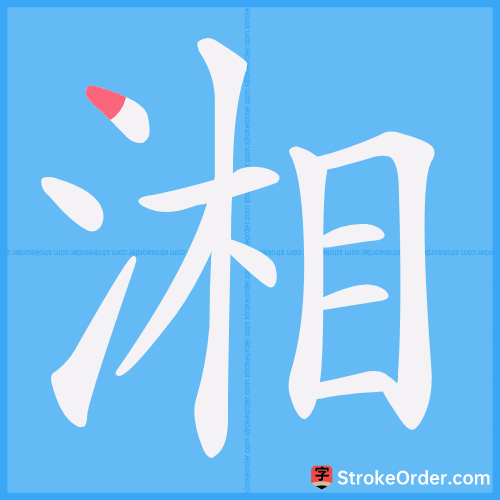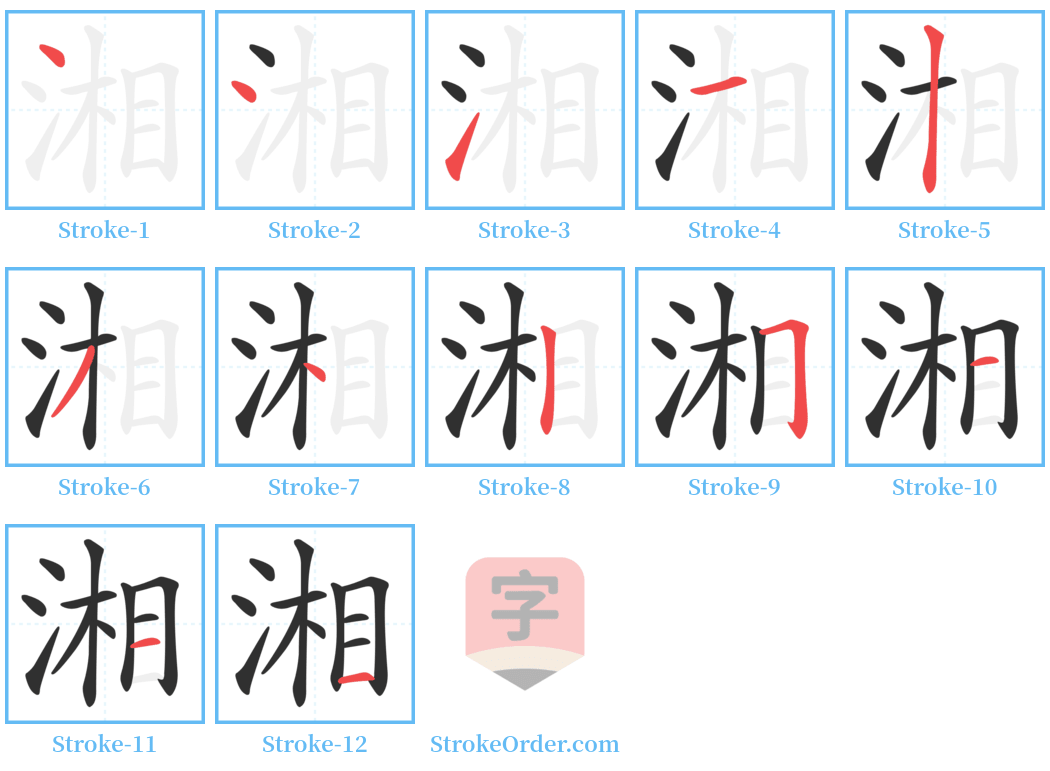湘 Stroke Order
Animated Stroke Order of 湘

Stroke Order Diagrams for 湘

Step-by-Step Handwriting Guide for 湘

Learn to Write Chinese Characters with Video Tutorials
Watch the video of writing the Chinese character "湘", learn the correct stroke order (笔顺) of the character "湘", and master the standard way of writing the character "湘".
Free Printable Handwriting Practice with Stroke Order: 湘
Printable Writing Practice Worksheet of "湘" in Portrait Orientation (Tian Zi Ge)

Printable Writing Practice Worksheet of "湘" in Landscape Orientation (Tian Zi Ge)

Information of 湘
Pinyin
xiāng
Radical
氵
Strokes
12 strokes
Usage
★★★★★
Definition
name of a river
湘 [xiāng]
1. [Xiangjiang River] A river name; sourced from the southern area of Guangxi Zhuang Autonomous Region in China, flowing through Hunan Province, and emptying into Dongting Lake.
2. An alternate name for Hunan Province.
湘 [xiāng]
1. [Xiangjiang River] The same as above.
2. Xiangshan (Xiang Mountain).
3. Referring to Junshan, located in the southwestern part of Dongting Lake in Yueyang, Hunan Province.
4. Referring to Huangling Mountain, located in the northern part of Xiangtan City, Hunan Province.
5. An abbreviation for Hunan Province.
湘 [xiāng] (Verb)
1. To boil.
湘 [xiāng]
1. [Xiangjiang River] As mentioned previously.
2. Xiangshan (Xiang Mountain).
3. Referring to Junshan, located in the southwestern part of Dongting Lake in Yueyang, Hunan Province.
4. Referring to Huangling Mountain, located in the northern part of Xiangtan City, Hunan Province.
5. An abbreviation for Hunan Province.
湘 [xiāng] (Verb)
1. To boil.
引:
1. From "Shuowen Jiezi": 湘, Xiang water. It rises in the north of Lingling Yanghai Mountain and enters the river. Zhu Junsheng noted: "It originates from Haiyang Mountain in Xing'an County, Guilin, Guangxi, sharing the same source as Li River, flowing through Xiangyin County, Changsha until it splits into two tributaries, rejoining at Dongting Lake called Xiangkou. There are claims it enters the river, but details remain unclear."
2. From "Chuci · She Jiang":沉玉躬兮湘汨 (沈玉躬 dips into the Xiang River).
3. From "Chuci · Yufu": 宁赴湘流,葬于江鱼之腹中 (Rather go with the Xiang flow, buried in the belly of river fish).
Examples:
如: 湘灵 (the spirit of Xiang water); 湘帘 (a curtain made of Xiangfei bamboo); 湘累 (referring to Qu Yuan); 湘妃之泪 (tears of sorrow and rage); 湘娥 (referring to Shun’s wife Ehuang); 湘江旧迹 (referring to the legend of the Xiang concubine crying for Shun).
湘 [xiāng] (Verb)
1. To boil.
引:
1. From "Shijing · Zaonan · Cai Pin": 于以湘之,维锜及釜 (Boil it with a spade and pot).
Examples:
如: 湘鱼 (boiled fish).
same as 斑竹[ban1 zhu2], mottled bamboo, since according to legend the spots on mottled bamboo are marks left by the tears shed by two of King Shun's 舜[Shun4] concubines (Ehuang 娥皇[E2 huang2] and Nüying 女英[Nu:3 ying1], known as the Concubines of the Xiang 湘妃[Xiang1 Fei1]) upon learning of his death
Xiangxi Tujia and Miao Autonomous Prefecture 湘西土家族苗族自治州[Xiang1 xi1 Tu3 jia1 zu2 Miao2 zu2 zi4 zhi4 zhou1] / western Hunan
Input Method for 湘
Pinyin
xiang1
Wubi
ishg
Cangjie
edbu
Zhengma
vfl
Four Corner
36100
Unicode
U+6e58
Same Pronunciation Characters